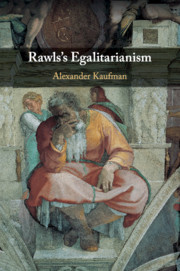
- Cited by 3
-
Cited byCrossref Citations
This Book has been cited by the following publications. This list is generated based on data provided by Crossref.
Matthew, D. C. 2019. Rawls’s Ideal Theory: A Clarification and Defense. Res Publica, Vol. 25, Issue. 4, p. 553.
2022. The European Union Social Policy on Older People in the Light of the Deinstitutionalisation of Social Services. p. 197.
Reidy, David 2024. Editor's introduction: Special issue—Rawls at 100; Theory at 50. Journal of Social Philosophy, Vol. 55, Issue. 2, p. 167.
- Publisher:
- Cambridge University Press
- Online publication date:
- May 2018
- Print publication year:
- 2018
- Online ISBN:
- 9781108554138




